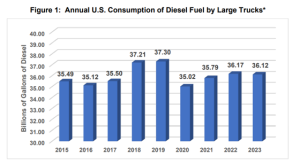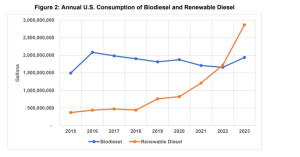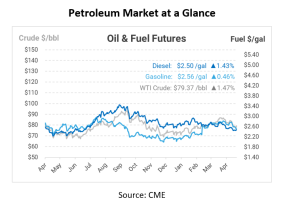
Electrifying Long-Haul Trucking? Study Finds Renewable Diesel a More Cost-Effective Path to Sustainability
The American trucking sector could significantly reduce its carbon footprint more swiftly and economically by adopting renewable diesel (RD) rather than electrifying its fleet, according to a new report released by the American Transportation Research Institute (ATRI).
The report offers a contrast in costs and logistical challenges between the two decarbonization strategies, highlighting that the costs of switching a Class 8 truck to a battery electric vehicle (BEV) is 5.8 times greater than adopting renewable diesel. Additionally, concluding that long-haul BEVs face range and cargo capacity limitations as well as fast charging challenges due to an underdeveloped infrastructure network.
Despite the often promoted environmental benefits of zero tailpipe emissions, ATRI’s report asserts that Class 8 BEVs will produce more CO2 over the life of the vehicle than the renewable diesel alternative, stating that “a transition from petroleum diesel to RD will result in a 67.3 percent decrease in per truck life-cycle CO2 compared to a 30.0 to 39.5 percent decrease in per truck life-cycle CO2 for BEV trucks. To achieve comparable CO2 reductions over 15 years, the transition to RD would cost $203 billion, compared to $1.19 trillion for BEV trucks.”
According to Jessica Masters, Director of Sustainability at Mansfield Energy, renewable diesel is not only more scalable than electrification for heavy-duty vehicles but can also be deployed immediately without modifying existing equipment or fuel storage infrastructure, allowing for quicker implementation of low-carbon solutions to meet reduction targets.
Masters also highlights that Mansfield Energy is at the forefront of supplying renewable diesel to the trucking industry, facilitating pilot programs that include Total Cost of Ownership assessments. “With our consultative approach, companies can obtain concrete data on the advantages of renewable diesel as demonstrated by their fleet, quantifying benefits beyond emissions reduction to evaluate maintenance and repair savings, helping them make informed alternative fueling decisions.
Renewable Diesel Consumption
The US trucking industry is a significant consumer of petroleum diesel, utilizing over 35 billion gallons annually. Of this, 28 billion gallons are used by the country’s 3.25 million combination trucks. However, a shift is noticeable in the industry’s fuel consumption patterns, particularly with the rise of Renewable Diesel (RD).

Source: ATRI – American Transportation Research Institute
Renewable Diesel use has skyrocketed to nearly 3 billion gallons in 2023, marking an increase of over 500 percent from 2018. This growth has led RD consumption to surpass that of biodiesel by 32.3 percent in the U.S. Notably, California is still leading the charge in RD adoption, with its sales comprising 73 percent of the total RD sold nationally.

Source: ATRI – American Transportation Research Institute
Looking for a dependable biofuel supplier?
Look no further! Mansfield provides customers with a wide range of biofuel blends — from biodiesel and renewable diesel to ethanol — to meet all your needs.
Contact the clean energy experts at Mansfield today to learn how to take the guesswork out of your sustainability goals.

This article is part of Daily Market News & Insights
Tagged: Long-Haul Trucking, renewable diesel, sustainability
MARKET CONDITION REPORT - DISCLAIMER
The information contained herein is derived from sources believed to be reliable; however, this information is not guaranteed as to its accuracy or completeness. Furthermore, no responsibility is assumed for use of this material and no express or implied warranties or guarantees are made. This material and any view or comment expressed herein are provided for informational purposes only and should not be construed in any way as an inducement or recommendation to buy or sell products, commodity futures or options contracts.





